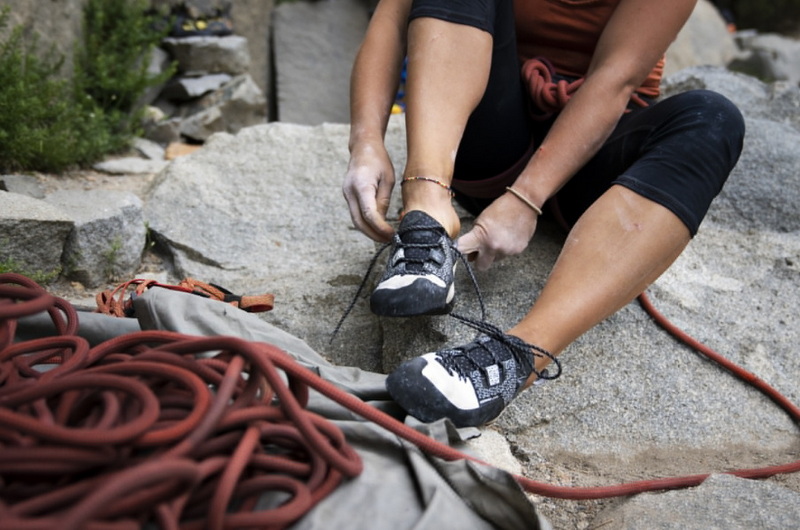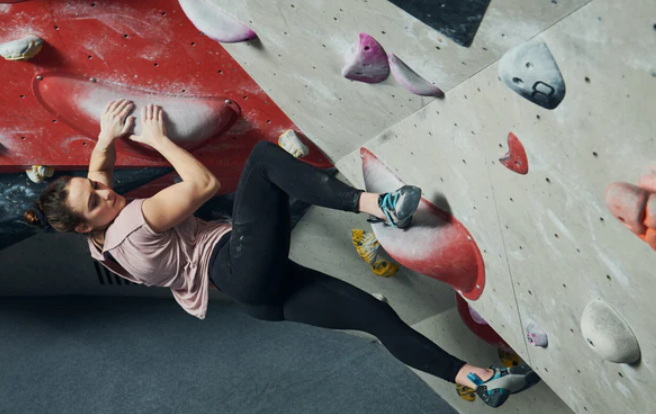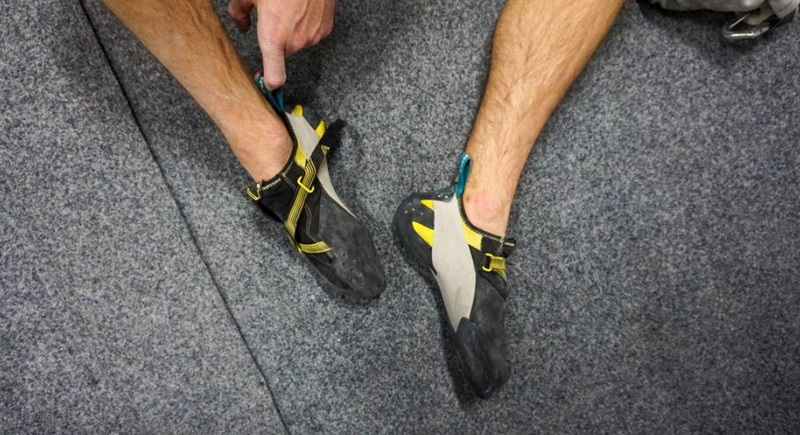Content Menu
● Introduction to Climbing Shoes
>> Men's vs. Women's Climbing Shoes
● Can Women Wear Men's Climbing Shoes?
>> Factors to Consider
● Choosing the Right Climbing Shoes
>> Example: La Sportiva Solutions
● Brands Moving Towards Genderless Shoes
● Climbing Shoe Fit Considerations
>> Understanding Foot Shape
>> Climbing Style and Shoe Features
● Popular Climbing Shoes
● Climbing Shoe Technology
● The Future of Climbing Shoes
● Conclusion
● FAQ
>> 1. What is the main difference between men's and women's climbing shoes?
>> 2. Can men wear women's climbing shoes?
>> 3. How do I determine if I have narrow, medium, or wide feet?
>> 4. What factors should I consider when choosing climbing shoes?
>> 5. Are climbing shoes becoming more genderless?
● Citations:
Climbing shoes are designed to provide a snug fit to enhance performance and comfort during climbing activities. Traditionally, climbing shoes have been categorized into men's and women's models, each tailored to fit the average foot shape of their respective genders. However, these distinctions are not absolute, and many climbers find that shoes from the opposite gender category fit them better. In this article, we will explore whether a woman can fit into men's climbing shoes and discuss the factors to consider when choosing the right climbing shoes.

Introduction to Climbing Shoes
Climbing shoes are specialized footwear designed to support climbers by providing a snug fit, flexibility, and grip. They are typically made from materials like leather or synthetic materials and feature a rubber sole for traction. The main difference between men's and women's climbing shoes lies in their size, volume, and sometimes color palette.
Men's vs. Women's Climbing Shoes
- Size and Volume: Men's climbing shoes generally have a wider toe box and higher volume compared to women's shoes, which are narrower and have less volume. This is because men's feet tend to be larger and wider on average.
- Color Palette: While not a functional difference, men's and women's shoes often have distinct color schemes. Women's shoes might be more aesthetically appealing to some climbers due to their color options.
- Weight and Sole Thickness: Women's shoes may have softer soles or thinner midsoles to accommodate lighter body weight, enhancing sensitivity and grip.
Can Women Wear Men's Climbing Shoes?
Absolutely, women can wear men's climbing shoes if they have wider or higher volume feet. The key is finding a shoe that fits well, regardless of the gender label. Many women with larger feet prefer men's shoes because they offer a better fit and more comfort.
Factors to Consider
When choosing climbing shoes, consider the following factors:
1. Foot Shape and Size: Determine if you have narrow, medium, or wide feet. Women with wider feet might prefer men's shoes, while those with narrower feet might prefer women's shoes.
2. Volume: High-volume feet require more space in the shoe, while low-volume feet fit better in narrower shoes.
3. Toe Shape: Ensure the shoe's toe box matches your toe shape for optimal comfort and performance.
4. Climbing Style: Different climbing styles (e.g., bouldering, sport climbing) may require different shoe features like downturn or stiffness.
Choosing the Right Climbing Shoes
Choosing the right climbing shoes involves more than just gender; it's about finding a shoe that fits your foot shape and climbing style. Here are some steps to follow:
1. Measure Your Foot: Use a piece of paper to trace your foot and measure its width to determine if you have narrow, medium, or wide feet.
2. Try Different Models: Visit a climbing store to try on various models, including both men's and women's shoes, to find the best fit.
3. Consider Performance Needs: If you're a beginner, prioritize comfort. For advanced climbers, a tighter fit may be preferable for precision.
Example: La Sportiva Solutions
The La Sportiva Solutions are popular among climbers for their aggressive downturn and snug fit. Both men's and women's versions are available, with the women's version being slightly narrower.
Brands Moving Towards Genderless Shoes
Some brands are moving away from gender-specific shoes, focusing instead on fit categories like narrow or wide. This approach can help reduce confusion and ensure a better fit for all climbers.
- Butora: Known for not having gender-specific shoes, Butora labels their shoes as narrow or wide fit.
- Evolv: Evolv has introduced genderless models, such as the LV (Low Volume) series.
- Scarpa: Scarpa has also experimented with genderless designs, like the Scarpa Drago LV.

Climbing Shoe Fit Considerations
Climbing shoes should fit snugly and close to the foot to provide support, allow for sensitivity to enable control on climbs, and provide enough grip on the rock. The inside of the shoe should fit like a second skin, with no gaps or hot spots[2]. When trying on shoes, ensure your toes are slightly curled but not painfully scrunched against the top of the shoe[2].
Understanding Foot Shape
Understanding your foot shape is crucial. Women often have narrower heels and lower volume toe boxes compared to men[6]. However, individual variations are significant, and some women may have wider feet that fit better in men's shoes.
Climbing Style and Shoe Features
Different climbing styles require different shoe features:
- Bouldering: Aggressive downturn and sticky rubber for grip on small holds.
- Sport Climbing: Stiffer soles for edging on vertical routes.
- Trad Climbing: More comfortable shoes with better support for longer climbs.
Popular Climbing Shoes
Here are some popular climbing shoes that cater to different needs:
- La Sportiva Katana Lace: Known for its powerful edging platform, available in both men's and women's versions with different rubber types[3].
- La Sportiva Tarantulace: A budget-friendly option with a flat last and roomy toe box, suitable for beginners[3].
- Scarpa Drago: Ideal for steep sport routes and bouldering with its aggressive downturn[5].
Climbing Shoe Technology
Climbing shoe technology continues to evolve, with innovations in materials and design:
- No-Edge Technology: La Sportiva's No-Edge shoes, like the Mandala, offer a sensitive feel with a rounded toe patch for better grip on shallow holds[3].
- Rubber Types: Different types of rubber, such as Vibram XS Edge and XS Grip 2, provide varying levels of stickiness and durability[3].
The Future of Climbing Shoes
As climbing becomes more popular, the demand for better-fitting shoes increases. Brands are responding by offering more genderless options and focusing on fit rather than gender labels. This shift is expected to continue, providing climbers with a wider range of choices tailored to their individual foot shapes and climbing styles.
Conclusion
In conclusion, whether a woman can fit into men's climbing shoes depends entirely on her foot shape and size. Climbing shoes should be chosen based on comfort and performance rather than gender labels. As the industry moves towards more inclusive and genderless designs, climbers will have more options to find the perfect fit.

FAQ
1. What is the main difference between men's and women's climbing shoes?
The main differences are in size and volume. Women's shoes are generally narrower and have less volume, while men's shoes are wider and have more volume.
2. Can men wear women's climbing shoes?
Yes, men can wear women's climbing shoes if they have narrow feet. It's common for male climbers with narrow feet to prefer women's models.
3. How do I determine if I have narrow, medium, or wide feet?
You can determine your foot width by tracing your foot on paper and measuring the width. Compare this measurement with standard charts to classify your foot as narrow, medium, or wide.
4. What factors should I consider when choosing climbing shoes?
Consider your foot shape, volume, toe shape, and climbing style. Ensure the shoe fits snugly but comfortably, and matches your performance needs.
5. Are climbing shoes becoming more genderless?
Yes, some brands are moving away from gender-specific models, focusing on fit categories like narrow or wide. This trend is expected to continue as the industry evolves.
Citations:
[1] https://www.climbingfacts.com/men-vs-womens-climbing-shoes/
[2] https://k2.com.au/blogs/the-k2-blog/how-to-get-the-perfect-fit-for-your-climbing-shoes
[3] https://www.switchbacktravel.com/best-rock-climbing-shoes
[4] https://climberspoint.com/blog/womens-climbing-shoes-design-and-fit-considerations/
[5] https://gearjunkie.com/climbing/best-climbing-shoes
[6] https://www.climbingshoereview.com/are-climbing-shoes-unisex/
[7] https://blog.weighmyrack.com/how-to-fit-climbing-shoes/
[8] https://www.reddit.com/r/climbergirls/comments/1bcsxb5/shoe_tips/
[9] https://www.lasportiva.com/en/climbing-shoes-technical-information
[10] https://www.cnn.com/cnn-underscored/outdoors/best-climbing-shoes
[11] https://www.climbingshoereview.com/how-tight-should-climbing-shoes-be/
[12] https://www.tiktok.com/discover/2025-fashion-trends-climbing-shoes
[13] https://www.reddit.com/r/climbingshoes/comments/1dl10g9/weight_determining_menswomens_shoe_model/
[14] https://www.absolute-snow.com/buying-guides/the-absolute-guide-to-how-rock-climbing-shoes-should-fit
[15] https://www.youtube.com/watch?v=dgFjerR8ovs
[16] https://www.rei.com/learn/expert-advice/rock-shoes.html
[17] https://redchiliclimbing.com/eu-en/news-tips-stories/which-climbing-shoe-size-do-i-have
[18] https://www.refinery29.com/en-us/shoe-trends-2025
[19] https://shop.boulderplanet.sg/blogs/news/understanding-climbing-shoes-fit-shape-and-rubber
[20] https://www.outdoorgearlab.com/topics/climbing/best-climbing-shoes

















